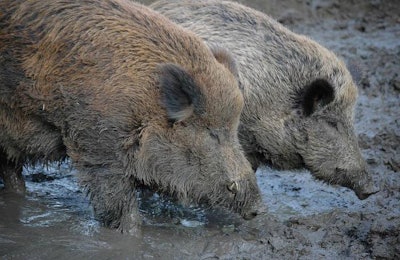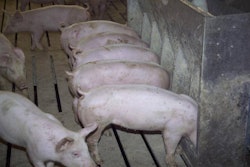
The pig sector in Germany is on high alert as the African swine fever virus is detected for the first time in western Poland, not far from the border.
Since last year, cases of African swine fever (ASF) have been reported in wild boar and domestic pigs in eastern provinces of Poland. In a worrying development, the country’s agriculture ministry has confirmed that the ASF virus has been detected in a wild boar in Lubusz (Lubuskie). This province is in the west of the country, and borders Germany. It is unknown how the infection was able to jump to an animal in such a distant location.
The wild boar was found dead on November 4 in a forest area, according to the official report from the Polish agriculture ministry to the World Organisation for Animal Health (OIE). The presence of the ASF virus was confirmed 10 days later.
With the location of the infection about 80 kilometers (50 miles) from the border, Germany is aware of the increasing risk of ASF entering the country and infecting the large population of domestic pigs and high density of wild boar.
Pig producers are being urged to raise their farm biosecurity, according to the Federal Ministry for Food and Agriculture (BMEL). An information campaign of posters and flyers has been initiated at service stations and rest stops. These warn the public about the risks of transmitting the ASF virus in pig meat and carelessly discarded foods.
Minister Hermann Onko Aeikens welcomed Polish efforts to control the spread of ASF, and for the participation in a joint ASF simulation exercise in 2018. This procedure contributed to veterinary cooperation in this area, he said.
ASF outbreaks in Europe’s domestic pigs
During the past week, Romania’s veterinary agency has reported a further 42 outbreaks in domestic pigs to the OIE. All were in backyard herds of between 1 and 50 animals across several regions of the country. In total, just over 500 pigs were lost to the disease in these outbreaks through mortality or culling.
There have been two recent ASF outbreaks in Ukraine, affecting 442 pigs, 12 of which died. The disease was confirmed at a backyard farm in Mikolaiv (Nikolaev) oblast in the south of the country, and at a farm in the eastern oblast of Poltava.
Having reported the first ASF outbreak in the district of Hincesti this month, the animal health agency of Moldova has confirmed cases at a second backyard farm in the same area in the past week. Located in the west of the country, Hincesti borders Romania.
Up to November 17, there have been 1,788 confirmed outbreaks of ASF among domestic pigs in Europe so far in 2019, according to the European Commission (EC).
From this source, by far worst affected has been Romania (1,609 outbreaks). Poland has 48, Bulgaria 41, Ukraine 40, Lithuania 19, the Republic of Serbia 18 and Slovakia 11. There has been one outbreak in Italy and Latvia, earlier in the year. EC figures do not include cases in Moldova or Russia.
Further outbreaks in European wild boar
In addition to Poland, four European states have reported cases of ASF in wild boar to the OIE over the past week.
Reporting the most new cases was Hungary (28 animals), across three broad areas of the north, northeast and center of the country. The majority of the 22 boar testing positive for the virus in Romania were found in southern and eastern regions. Veterinary authorities in Latvia and Bulgaria confirmed 10 and seven ASF-infected wild boar, respectively.
OIE was also informed by the animal health agency in Belgium about a further suspected case of ASF in a wild boar. In the province of Luxembourg, fragments were found from an animal that had died at least six months previously. After such a long period, it was not possible to confirm or rule out the infection.
This year, there have been 5,327 confirmed outbreaks of ASF among European wild boar up to November 17, according to the EC. That figure is has increased by 84 from the previous week’s report.
Poland has reported the most outbreaks (1,965), followed by Hungary (1,337), Romania (578), Belgium (481), Lithuania (427), Latvia (313), Bulgaria (94) and Estonia (75). Other European states reporting some outbreaks in wild boar during 2019 — but fewer than 30 animals affected — are Italy, Slovakia and Ukraine.
More ASF in wild boar in Russia’s Far East, South Korea
A further 13 wild boar have tested positive for the ASF virus in Primorsky krai, according to the latest report from the agriculture ministry in Moscow to the OIE. Primorsky krai is in the Far Eastern Federal District of Russia, where the disease has been detected since July.
South Korea’s agriculture ministry has reported to the OIE that a further three wild boar have been found dead in the Cheorwan region of Gangwon province. Each animal has tested positive for the ASF virus. Previous cases have been confirmed in the same area, which lies close to the Demilitarized Zone between South Korea and the Democratic People’s Republic of Korea.
Over the past week, the OIE has received no reports of confirmed ASF cases in domestic pigs from countries in Asia or Africa.
Scientists from the U.S. and Canada have begun a new initiative to prevent and control of ASF in Vietnam. They will be working with the national government as well as local agencies, veterinarians, and pig producers,
View our continuing coverage of the African swine fever outbreak.

















